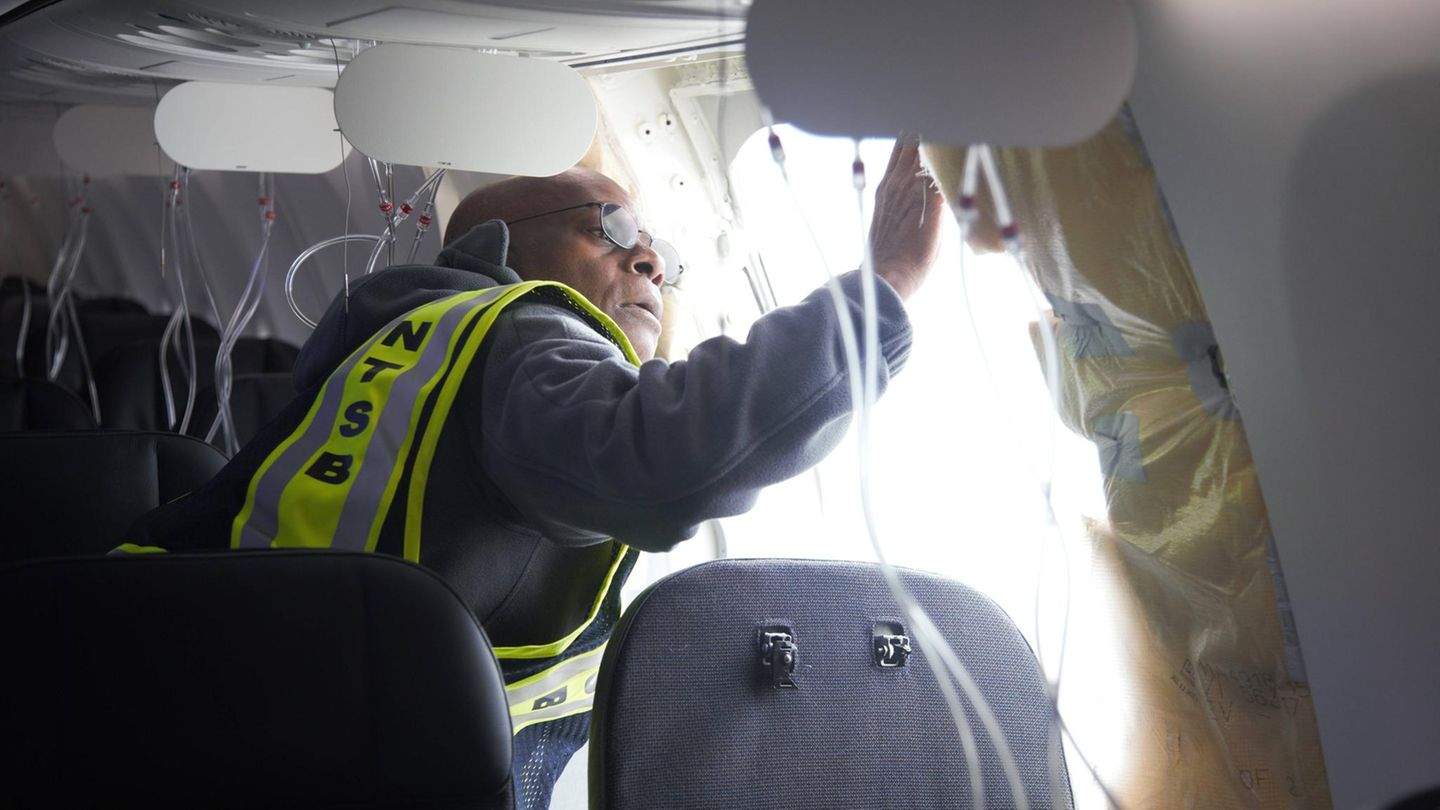After two fatal crashes, aircraft manufacturer Boeing appeared to have gotten its quality deficiencies under control. But now the next incident with a 737 Max, which lost a part of the wall in the middle of the flight, shows that the problems are deeper.
Photos show a door-sized hole in the plane’s wall, with oxygen masks dangling from the ceiling. A window tore out of the Boeing 737 Max 9, which was en route from Portland to Ontario on Friday, shortly after takeoff. The Alaska Airlines plane was able to land safely and no one was seriously injured.
But for the US aircraft manufacturer Boeing, the incident is one of a long list of quality problems. Around four years after the fatal crashes of two jets from the 737 Max series and the subsequent collapse in share prices, the company appeared to be recovering. But now it turns out that there are still quality deficiencies that are tarnishing the image of the former industry leader. Experts fear that the problem runs deeper, even if the financial impact is likely to be limited.
Is Boeing skimping on quality?
At the Boeing factory near Seattle, almost 38 aircraft are being built every month, but competitor Airbus has now overtaken Boeing – and is producing almost twice as many in the same time. Despite delivery delays, Boeing is trying to increase the pace of building its Max aircraft. The aircraft manufacturer only receives money upon delivery. The group’s free cash flow is expected to increase to $10 billion annually by 2026 – in 2022 it was less than $3 billion. The speed is therefore crucial for the economic success of the company. But is it possible that quality is also being sacrificed due to time pressure?
Boeing denies this and said safety remains its top priority. But not all investors believe that the aircraft manufacturer has everything under control.
The incident now affects a key supplier to Boeing, Spirit Aerosystems, which builds the fuselage of the Max aircraft and then sends it to Seattle. The breakout of the wall piece is apparently related to a hole in the aircraft’s fuselage tube. “The hole is located shortly behind the wing. An additional emergency exit can be installed here for a larger number of passengers,” explains aviation expert Heinrich Großbongardt to Capital. “Otherwise the opening will be closed mechanically, as is now the case with Alaska Airlines.” This lock apparently came loose shortly after the machine took off on Friday evening.
As a rule, when building aircraft, several screws are always installed for safety reasons, even if one would be enough. The exact cause of the window break is currently being clarified. What is certain, however, is that United Airlines and Alaska Airlines found loose screws when checking other Max planes – on the very fuselage component from which the window had broken out.
But this incident is far from the only one: In 2023, incorrectly drilled holes and improperly manufactured fittings were found on some Boeing aircraft. In 2018 and 2019, defective cockpit software on the 737 Max 8 even led to two planes crashing and 346 people dying.
Report: Profit at the expense of security
In the US House of Representatives’ final report on the background to the two crashes, there was talk of cultural problems at Boeing. “The key findings of this report point to a corporate culture in dire need of a security reset,” the report concluded. Since the turn of the millennium, the company has focused too much on profit at the expense of safety.
At Boeing, fewer and fewer engineers were in charge because the separation between finance and technology was weakened. “This led to many wrong decisions in production and to quality deteriorating over a long period of time,” says Großbongardt, who was a spokesman at Boeing for ten years. “Now they’re trying to turn things back, but it’s a long way.” Another cultural problem is that there have been conflicts between Boeing and the unions for years, which have worsened the internal mood and motivation in the company.
Airplane food
Lobster tails, cigars, cognac: this is how decadent the dining on board used to be
171 737 Max aircraft must now remain on the ground, as ordered by the US Federal Aviation Administration (FAA). Other authorities around the world also banned them from flying. After all, the Max-9 currently only makes up around one percent of the global fleet anyway. In terms of seats, their share of global capacity is even smaller.
Analysts see potential for Boeing shares despite losses
Maintenance of these retired machines will likely cost $18 million and take up to eight hours. The effort was significantly greater in 2019, when Max 8 machines were not allowed to start for almost two years. “Compared to what was going on with the Max a few years ago, this problem is rather small,” says Großbongardt. “But more could have happened. This is another additional scratch on Boeing’s reputation.”
A look at Boeing’s balance sheets shows that the company has some catching up to do when it comes to important metrics. “The equity ratio has been very thin for a long time,” says balance sheet expert Nikolaj Schmolcke. “A crisis hits straight away.”
Boeing shares did relatively well last year. At the start of the stock market week, however, the price fell by seven percent to just under 211 euros. For analysts, this is initially no reason to fundamentally change their assessment of the company: According to Morningstar analyst Nicolas Owens, the share price can rise to $232. He believes the inspections or manufacturing changes will not have a significant financial impact on Boeing or its customers.
Deutsche Bank also assumes this: “The stock will certainly open downwards, and the short-term bull market is more likely to be at risk,” says Scott Deuschle, analyst at Deutsche Bank in New York. This applies until, firstly, the Max 9 fleet is fully airborne again, no faulty door plugs have been identified and, secondly, there is a better idea of what caused the door plug failure on the affected flight.
If the FAA requires Boeing to conduct a more extensive pre-delivery inspection of the Max-9, it could impact the pace of deliveries, said Cai von Rumohr, an analyst at TD Cowden. However, Deutsche Bank is confident that new Max aircraft will be delivered again this week, “which should help allay investor concerns.” A longer delivery stop is unlikely.
Experts do not believe that customers are now canceling a large number of aircraft from Boeing. The order backlog from airlines such as Lufthansa and Emirates is good. “Lufthansa always has someone on site at the manufacturer who supervises the construction and checks whether the work is carried out cleanly,” explains Großbongardt. “They’ll probably just take a closer look now. Nobody needs to be afraid of crashing their plane now.”
Source: Stern




